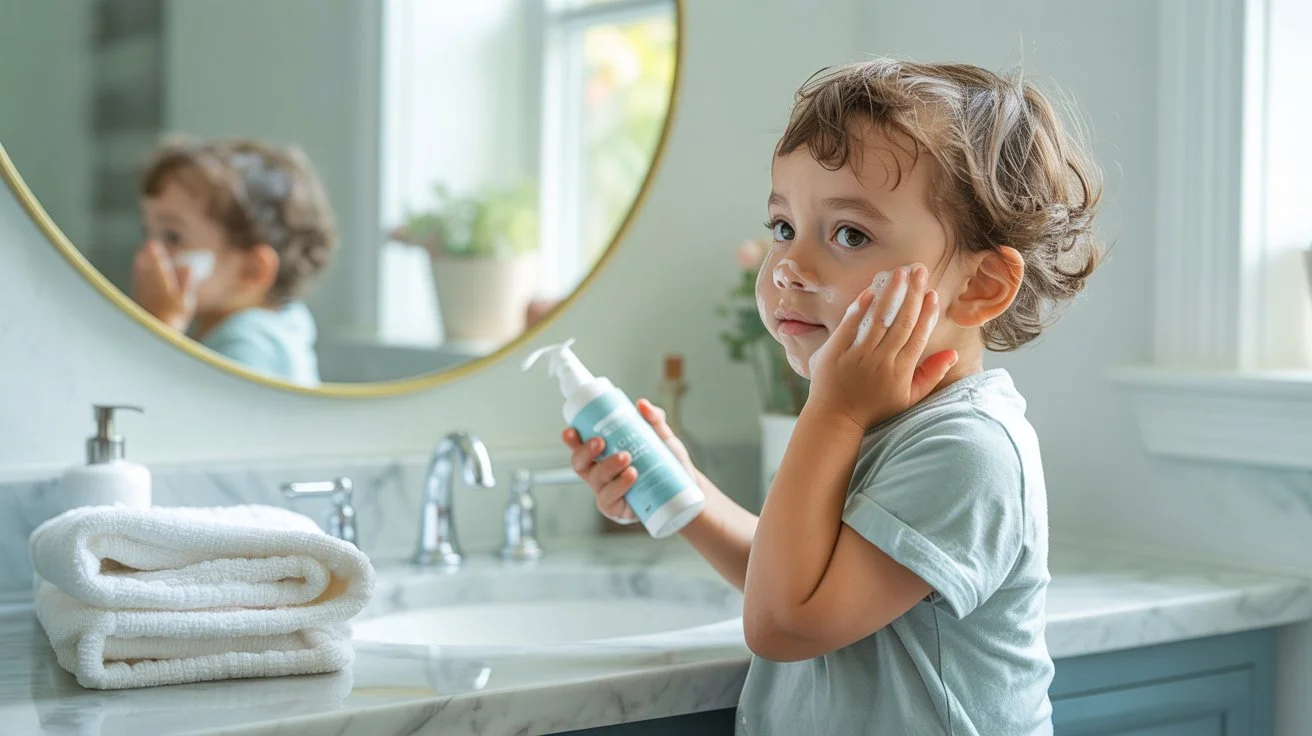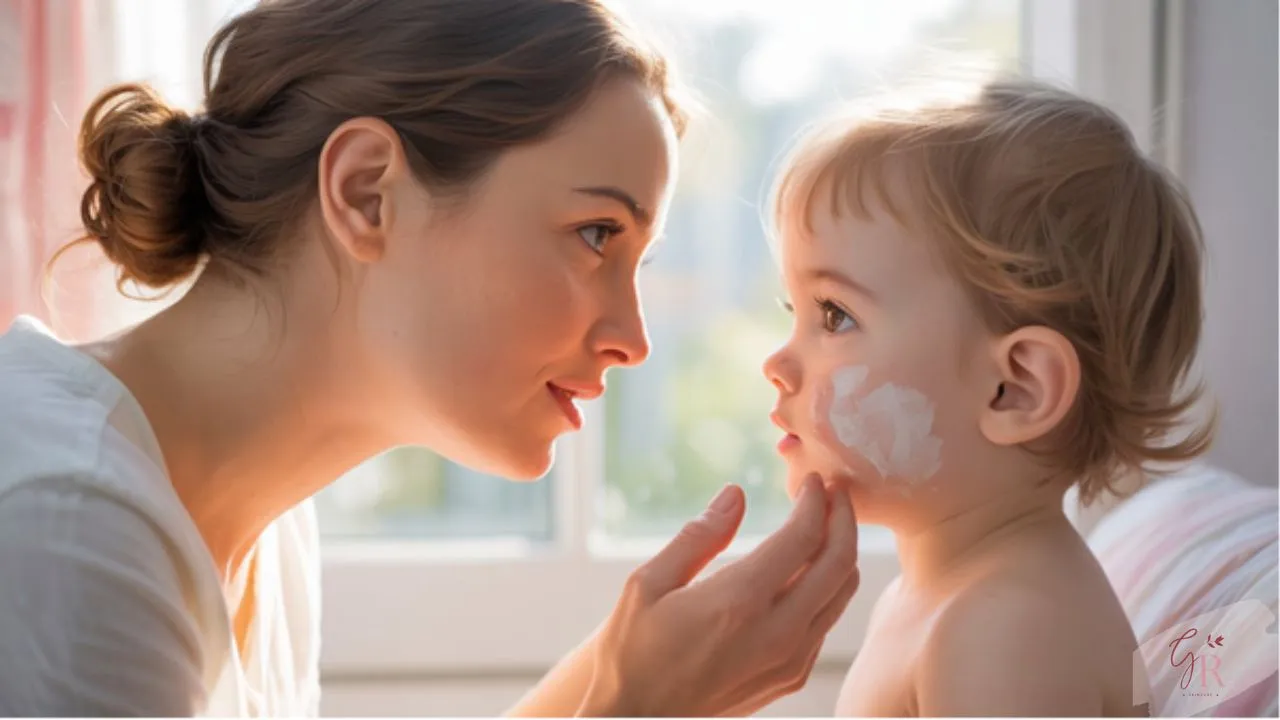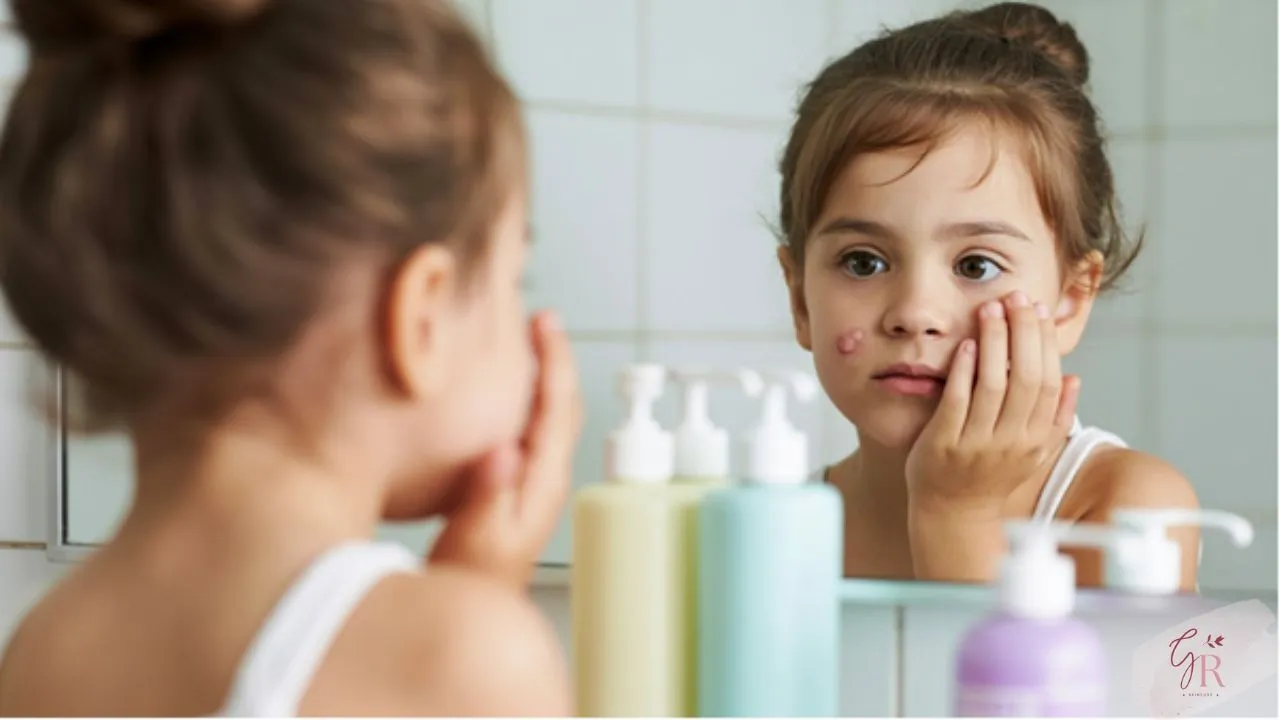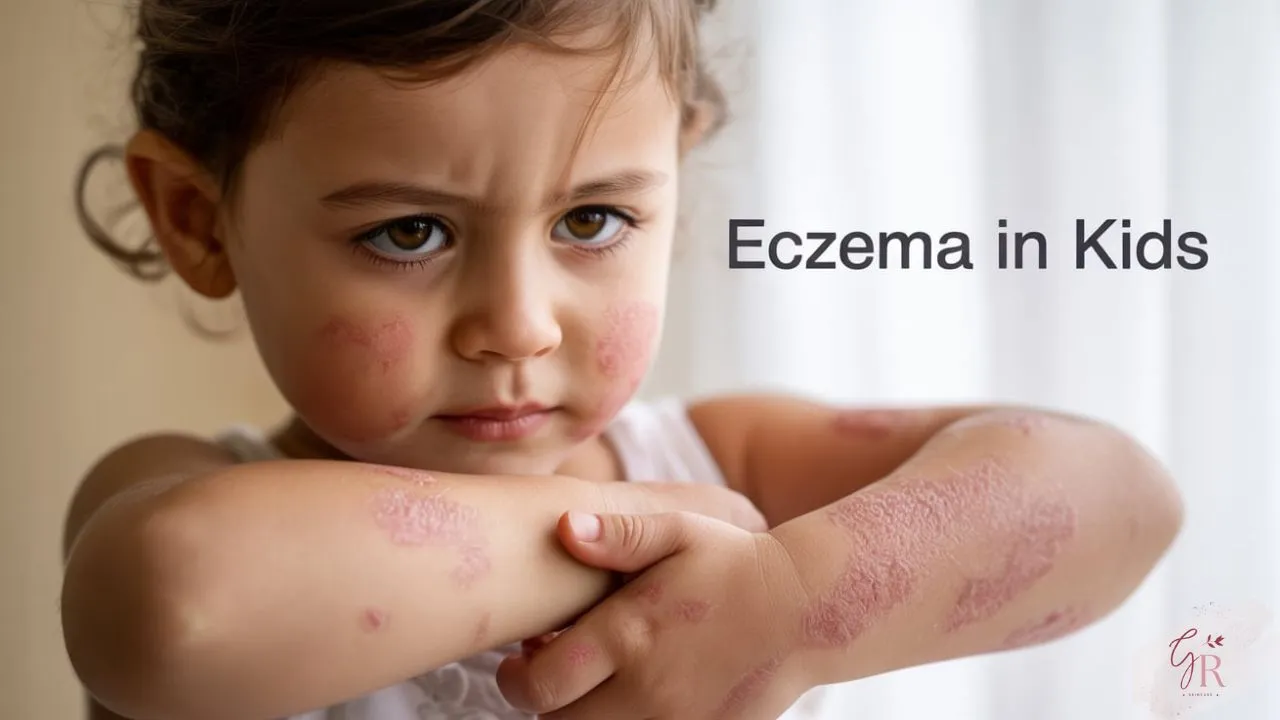👩⚕️ About the Author: I am certified from Pediatric Skincare Education and Childhood Dermatology Basics (CPD-UK) course. I have studied every stage of children’s skin scientifically – and many families have used my skincare tips and found them very helpful.
Every new parent dreams of keeping their baby’s skin soft, rash-free and comfortable — but the first few months can seem very challenging. Babysitting babies’ skin is very delicate, very different from that of older babies or toddlers, and so you need a care product that is soft and safe. So a gentle newborn skincare routine is not just a question of beauty, but also of comfort, protection and health.
You may notice:
- Small red rashes that come on suddenly
- Dry or flaky patches that cause irritation
- Oily spots, baby acne or skin peeling that looks weird
All of these things are completely normal in the first 0-3 months, and they don’t mean that something is wrong. Whether it’s choosing the right cleanser, moisturizing, or protecting your baby’s delicate skin, our guide will help you care for your little one with love and confidence.
Why trust this guide? Because it’s based on expertise, the latest research, and understanding the challenges of parents.
In this guide, you will find:
- Step-by-step newborn skincare routine (specially for 0–3 months)
- Trusted tips from pediatricians and dermatologists
- Simple home remedies that work in real life
- Answers to common concerns of parents — like newborn rash, dry skin and baby acne
Understand that this is your gentle roadmap — not fancy products, but soothing and science-based practices that will make your baby feel safe and cared for.
Why Newborn Skin Needs Extra Gentle Care

Newborn skin is very delicate, and it needs to be treated with utmost care and attention. This is important because:
- Thinner and More Sensitive: Toddlers’ skin is much thinner than that of adults or older children, especially their outer protective layer (stratum corneum) is thin, which does not protect them from getting damaged easily.
- Prone to Dryness and Irritation: Due to the immature skin barrier, moisture easily escapes from the skin, which reduces the chances of dryness, redness and rash.
- Developing Natural Defenses: The pH of the skin and immune system of children are not fully developed, so there is less advice to protect the skin from infections.
Scientific Insight
The skin of infants is functional at birth but is not fully mature. The outer layers of the skin are 20-30% thinner than that of adults, making them susceptible to transepidermal water loss (TEWL). This means that water drains out of the skin more quickly, which causes dryness and burning. At the same time, the baby’s skin is adapting from the dirt of the mother’s stomach to a cold, dry world, which creates a lot of stress for them. 1
The natural pH of a baby’s skin is a little higher initially, but within a few months it develops functions that protect it from acid mentality and infection. These are all reasons why newborn skin should be considered in a different way from the skincare routines of older children or adults.
Research by the American Academy of Pediatrics and Dermatology has shown that newborn skincare routines should use gentle, fragrance-free, and specifically formulated products that maintain the natural balance of the skin.2
What This Means for Your Newborn Skincare Routine
- Avoid harsh soaps or irritants.
- Use products specifically formulated for newborns that help break the skin barrier.
- Keep bathing time short and the water not too hot so that you don’t overuse natural oils.
- Moisturize daily to maintain hydration and prevent dryness.
By adopting such care for your grandmother that is based on these important rules, you are laying a strong foundation for his well-being and life.
Understanding Common Newborn Skin Types
The skin of newborn babies is very delicate and they are adjusting quickly to the different conditions of the new world. Every baby’s skin type is different which depends on genetics and environment. Understanding common skin types helps parents to take care of their baby’s skin.
Normal Skin in Newborns
- A slight dryness or peeling of the skin of newborn babies is common which is a natural shedding of skin cells after birth.
- This peeling is a natural adjustment that is part of taking your skin from a warm, humid environment to a drier environment.
- Normal skin is soft, gentle and hydrating and doesn’t cause much irritation.
- Mild dryness doesn’t require much treatment; mild soap and regular moisturizing are enough.
Note: This light peeling shows that your skin is adapting well. Avoid harsh soaps and excessive bathing that strip out skin oils.
Newborn Dry Skin
- The cause of dry skin is loss of vernix caseosa (which is produced on the skin of babies), dry atmosphere and excessive bathing.
- Eczema or allergy can also be the cause of dry skin.
- To prevent dryness, it is necessary to bathe in lukewarm water for 3-5 minutes, use a mild cleanser and apply a fragrance-free moisturizer after bathing.
- Bathing too often can make the skin even drier, so do not bathe too much to avoid this.
Tips to treat newborn dry skin safely:
- Apply hypoallergenic and mild lotions.
- Avoid fragrance or color.
- Use a humidifier in hot or dry environments.
- Wear loose and cotton clothes.
This way you can protect your baby’s delicate skin and prevent dryness.
Newborn Oily Skin
- Some babies may have oily skin because their skin glands are still balancing and the mother’s hormones cause more oily secretion.
- Baby acne, which shows small red or white spots, is common and nothing to worry about.
- This acne gets better on its own after a few months.
- Use a gentle and mild baby cleanser to avoid excess oil build-up and keep the skin clean.
Why is my newborn’s face so oily?
- Increased oil production is natural because the glands in your baby’s skin are still regulating.
- The mother’s hormones temporarily stimulate oil glands after birth.
- This extra oil helps protect the skin during the transition out of the womb, but it can cause your baby to develop rashes or breakouts.
- Avoid rubbing vigorously or using adult skin care products, as these can irritate sensitive newborn skin.
The best approach to newborn oily skin is patience, gentle cleansing, and avoidance of irritating substances.
Common Newborn Skin Concerns & Remedies
Newborn skin, while delicate and adorable, can present several common concerns that worry new parents. Understanding these issues and their safe remedies can help keep your baby’s skin healthy and comfortable. Whether it’s a rash caused by heat, diaper irritation, or mild allergic reactions, knowing when to manage at home and when to seek pediatric care is key to newborn skin wellness.
Newborn Skin Rash
- Common newborn rashes include heat rash (miliaria), diaper rash caused by wetness and friction, and allergic reactions to detergents or fabrics.
- Heat rash appears as tiny red papules in warm, moist areas and usually clears up once cooling measures are taken.
- Diaper rash presents as redness and irritation in the diaper area, often preventable by frequent diaper changes and keeping the area dry.
- Allergic rashes may appear as hives or widespread red patches, requiring pediatric evaluation to identify triggers.
- Safe remedies:
- Keep baby cool and avoid overdressing.
- Frequent diaper changes and use of gentle barrier creams.
- Use mild, fragrance-free detergents and soaps.
- When to see a pediatrician: If the rash is severe, spreading, or associated with fever or discomfort.
Baby Acne (Neonatal Acne)
- Baby acne is caused by maternal hormones stimulating the baby’s sebaceous glands during the first few months.
- It usually appears as red or white bumps on cheeks, nose, and forehead, and clears up on its own.
- Avoid picking or squeezing acne to prevent irritation or infection.
- Gentle care routine involves:
- Washing baby’s face with lukewarm water and mild baby cleanser once daily.
- Avoiding oily or harsh skincare products.
Peeling Skin in Newborns
- Peeling in newborns is typical as dry, old skin sheds after birth, especially in babies born past their due date.
- Normal peeling involves small flakes or patches and resolves naturally without intervention.
- Concerning peeling patterns include deep cracks, redness, or signs of infection, needing medical attention.
- Natural oils and moisturizers can soothe and protect newborn skin during peeling:
- Use fragrance-free, hypoallergenic baby lotions or gentle natural oils such as coconut oil.
- Avoid over-bathing to prevent further dryness.
Step-by-Step Newborn Skincare Routine (0–3 Months)

A simple, gentle skincare routine can promote healthy skin in your newborn during the critical first three months. Start with a brief overview of the routine, followed by detailed steps catering to newborn skin’s sensitive nature.
Step 1 – Gentle Bathing (2–3 times a week)
- Use lukewarm water around 37°C for baby’s bath to avoid chilling or overheating.
- Avoid harsh soaps; choose fragrance-free, hypoallergenic baby cleansers specially formulated for delicate skin.
- Limit bath time to 5–7 minutes to preserve natural oils.
Step 2 – Moisturizing After Bath
- Apply hypoallergenic baby lotion or natural oils (such as organic coconut oil) within 2–3 minutes post-bath to lock in moisture.
- Regular moisturizing supports the skin’s natural barrier function and prevents dryness.
Step 3 – Diaper Area Care
- Clean diaper area with fragrance-free wipes or plain cotton soaked in warm water.
- Apply a thin layer of diaper cream (zinc oxide or petrolatum-based) to prevent diaper rash.
Step 4 – Clothing & Fabric Care
- Dress baby in soft, breathable cotton fabrics to avoid irritation.
- Wash baby clothes separately using fragrance-free, mild detergents.
Step 5 – Sun & Weather Protection
- Avoid applying sunscreen on babies under 6 months. Rely on shade, hats, and breathable blankets for protection.
- Keep baby’s skin shielded from harsh weather conditions.
For a complete roadmap beyond the newborn stage, explore our Kids Skincare Routine by Age: Complete Guide for Parents to understand how skincare needs evolve as your child grows.
Choosing Safe Skincare Products for Newborns

Selecting safe, gentle skincare products is critical since newborn skin is extraordinarily sensitive and prone to irritation.
- Avoid harmful ingredients such as Sodium Lauryl Sulfate (SLS), parabens, artificial fragrances, and dyes.
- Opt for products verified by the Environmental Working Group (EWG) or dermatologist tested for baby skin.
- Remember, “natural” labels don’t always mean safe—some natural ingredients can also irritate delicate newborn skin, so always check product safety and suitability.
Seasonal Skincare Tips for Newborns
Providing your newborn with the right skincare throughout the year ensures their skin remains healthy, hydrated, and irritation-free. Adjusting your newborn skincare routine according to the season can prevent common skin troubles linked with weather changes and keep your baby’s skin comfortable.
Winter Care
- Cold, dry winter air strips moisture from newborn skin, leading to dryness and chapping.
- Combat dryness by moisturizing frequently with fragrance-free, hypoallergenic lotions or natural oils such as organic coconut oil.
- Limit bath times to preserve natural oils and use lukewarm water.
- Dress your baby in layers using soft fabrics to keep warmth without irritation.
- Use a humidifier indoors to add moisture to dry air and protect delicate skin.
Winter care is crucial for maintaining newborn skin barrier integrity against harsh environmental conditions.3
Summer Care
- Summer heat increases sweat and moisture which can clog pores and cause heat rash (miliaria).
- Prevent heat rash by dressing baby in light, breathable cotton clothes and keeping them in shaded, cool areas.
- Use gentle, fragrance-free cleansers to keep skin cool and clean.
- Bathe baby more frequently to remove sweat but avoid over-bathing which can dry out skin.
- Keep diapers dry and change frequently to prevent irritation from sweat and heat.
Summer skin care requires balancing moisture and sweat management for optimal newborn skin health.4
Myths vs Facts About Newborn Skincare
Separating fact from fiction helps parents make confident, informed decisions about newborn skin care.
- “Daily baths are a must” → Myth. Daily baths can dry out a newborn’s skin; 2–3 baths per week are more appropriate.
- “Baby oil is always safe” → Fact. Not all baby oils are equal; choose high-quality, pure oils that do not clog pores or cause allergies.
- “Natural = always safe” → Myth. Some natural oils can cause allergic reactions or irritate sensitive newborn skin; always test and choose with care.
Being aware of common myths reduces confusion and promotes gentle, safe newborn skincare routines.
When to Seek Medical Advice
Although many skin issues in newborns are mild and resolve naturally, certain signs require prompt pediatric consultation:
- Rashes that persist beyond a few days, spread rapidly, or involve swelling and oozing.
- Sudden color changes in the skin, such as intense redness, paleness, or bluish tint.
- Fever accompanied by skin symptoms indicating possible infection or systemic illness.
Early medical intervention prevents complications and ensures appropriate treatment.
Quick Checklist for Newborn Skincare Routine

Here’s a concise recap to keep your newborn skincare routine simple and effective:
- Bath 2–3 times per week with lukewarm water.
- Moisturize daily with hypoallergenic lotion or natural oils.
- Protect diaper area using barrier cream and frequent changes.
- Dress baby in gentle, breathable fabrics like cotton.
- Avoid harsh chemicals, fragrances, and excessive bathing.
This quick checklist helps parents remember key steps in nurturing healthy newborn skin.
Expert-Recommended Newborn Skincare Products
Selecting the right products is as important as the routine itself. Experts recommend:
- Dermatologist-approved gentle cleansers that are fragrance-free and hypoallergenic.
- Moisturizers rich in emollients like ceramides and free from harmful additives.
- Non-promotional but medically endorsed diaper creams that protect against irritation and rash.
Choosing trusted, safe products supports the delicate newborn skin barrier and reduces risk of allergic reactions and dryness.
FAQ’s
How often should I bathe my newborn baby?
It is recommended to bathe newborns 2–3 times per week with lukewarm water using gentle, fragrance-free cleansers. Over-bathing can dry out delicate skin by stripping natural oils.
What are the best moisturizers for a newborn’s sensitive skin?
Use hypoallergenic, fragrance-free baby lotions or natural oils like organic coconut oil. These help lock in moisture without irritating the skin’s sensitive barrier.
How can I prevent diaper rash in my newborn?
Change diapers frequently, keep the diaper area clean and dry, and apply protective diaper creams such as those containing zinc oxide to prevent irritation.
What causes baby acne and how should I treat it?
Baby acne results from maternal hormones and typically clears up on its own within a few months. Avoid picking at the acne and cleanse gently with mild baby products.
Why does my newborn’s skin peel after birth?
Peeling is a normal process as newborn skin sheds the outer dry layers post-delivery. It usually resolves without treatment; however, if excessive or accompanied by redness, consult a pediatrician.
Are natural skincare products always safe for newborns?
Not always. Some natural oils and botanicals can cause allergic reactions or irritation in some babies. Always choose dermatologist-tested, hypoallergenic products and do a patch test.
How do I protect my baby’s skin in winter and summer?
In winter, moisturize often, use humidifiers, and dress your baby in layers. In summer, avoid overheating, dress in breathable cotton, and avoid direct sun exposure especially for babies under 6 months.
When should I seek medical advice for my newborn’s skin?
See a pediatrician if rashes persist, worsen, are accompanied by swelling, oozing, sudden color changes, or if your baby has a fever with skin symptoms.
Conclusion
Taking care of your baby’s skin can feel overwhelming, but with the right newborn skincare routines, it becomes simple and rewarding. Gentle bathing, proper moisturizing, protecting delicate areas like the diaper region, and choosing safe products are the cornerstones of keeping your newborn’s skin healthy and happy. Remember, every baby’s skin is unique, so observe your little one closely and adjust your routine as needed. With consistent care and attention, you can help your baby’s skin stay soft, hydrated, and free from irritation during these precious early months.
References
[1]. Lorena S. Telofski et al., “The Infant Skin Barrier,” Dermatology Research and Practice, 2012. Available: [link]
[2]. Lorena S. Telofski et al., “Biomarkers of neonatal skin barrier adaptation reveal substantial differences compared to adult skin,” Pediatric Research, 2020. Available: [Link]
[3]. American Academy of Family Physicians. (2008). Newborn Skin: Part I. Common Rashes. American Family Physician, 77(1), 47-56. Available at: [Link]
[4]. WebMD. (2024). Simple Tips to Keep Your Baby’s Skin Healthy. Available at: [Link]
Hi, I’m Ramsis — a passionate skincare researcher who believes in the power of gentle, natural care for kids and teens. I spend my time studying dermatology-backed methods and safe home remedies to help parents make confident skincare choices. Every tip you read here is carefully researched and simplified just for you!





